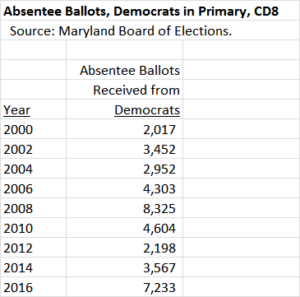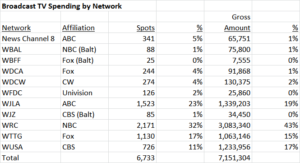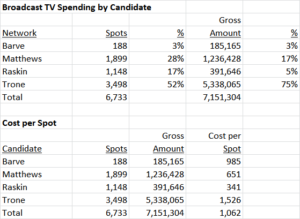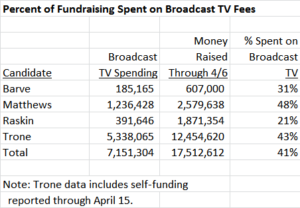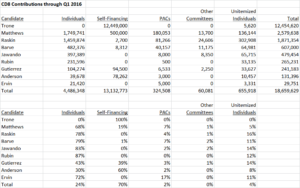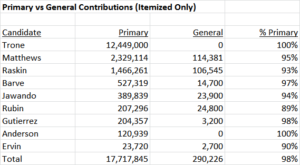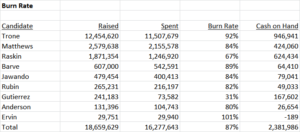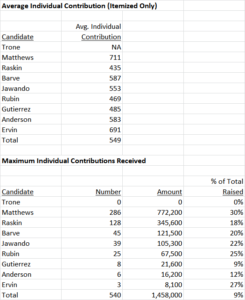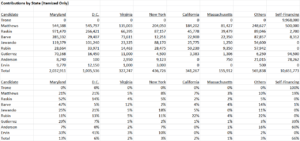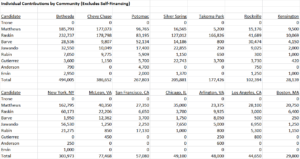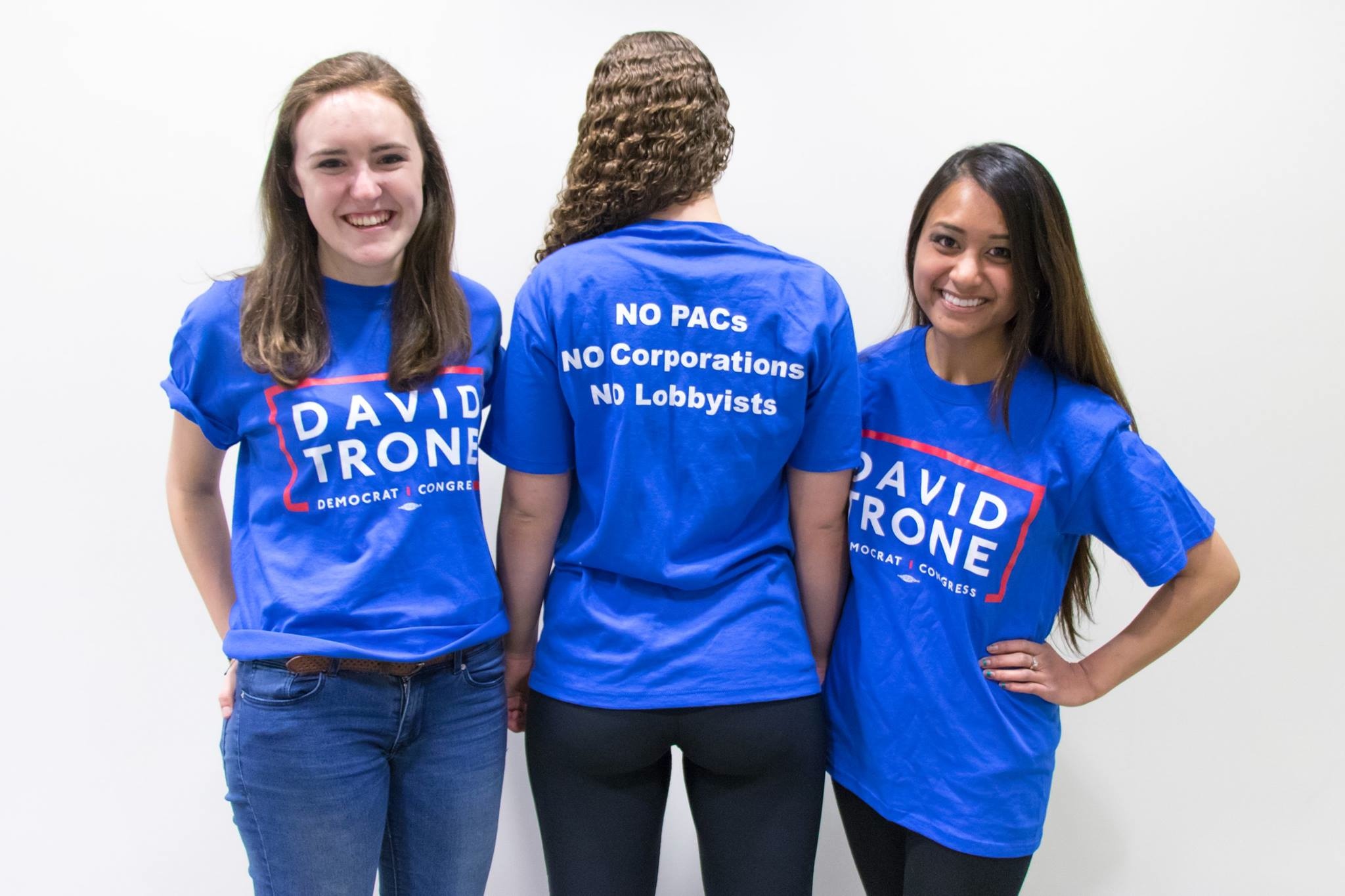A guest blog by Adam Pagnucco.
For the sake of posterity, here are a few thoughts on The Aftermath of the historic race for Congress in District 8.
Jamie Raskin
Senator (soon-to-be Congressman) Raskin is now the King of MoCo Progressives, a title he would have gained even if he had lost the election. Raskin is the King because of the kind of campaign he ran, which mixed liberal issues with a record of accomplishment, a dose of passion and a lot of inspiration. The fact that he had two well-financed opponents, one of whom was self-funded, played into his narrative. For progressives, he appealed to both their hearts and their brains. His vote percentage, currently about a third of the electorate, came from high-information voters, super-liberals and Downcounty residents, a desirable base for almost any MoCo candidate. It would not be a stretch to imagine that he had the support of 90% or more of the party activists who often play outsized parts in deciding County Council and state legislative races.
All of this gives Raskin enormous potential influence over county politics. Chris Van Hollen was the most popular elected official in MoCo during his tenure in the U.S. House, but he was rather cautious about using that asset. He endorsed sparingly in primaries, and even then with great care. Examples include safe picks like County Executive Ike Leggett in 2014 and the incumbent state legislators in District 18, where he served as a State Senator and Delegate. Van Hollen never took chances on endorsing unknown or controversial candidates. Raskin will soon be approached by many politicians, incumbents and non-office holders alike, seeking his support. Will Raskin follow the Van Hollen model and stay out of most races? Or will he actively try to get very progressive candidates elected down the ballot? Lots of politicians and activists would like to know the answer to this question!
David Trone
Ninety days ago, few voters had any idea who David Trone was. Many millions of dollars later, Trone finished six points behind Raskin, a margin that could tighten a little bit as absentee ballots are counted. As David Lublin has noted, Trone ran a competent, professional campaign that put batters on all the bases – advertising, mail and field. He bested Kathleen Matthews, who had been running for many months, and smoked the rest of the field.
Trone should be encouraged by his showing in Carroll and Frederick Counties, where he finished with 53% and 52% of the vote, respectively (and that is before absentee counts come in). If Congressman John Delaney runs for Governor, Trone’s performance in the two Western Maryland counties suggests that he has potential in Congressional District 6. If Trone would like to run for office again – and he is considering it – one weakness that he should consider addressing is the allegation that he has not been involved in local affairs. Trone would be a great champion for the local business community, and he could also be a patron for Democratic Party activities and institutions. Projects like these would shore up his hometown credibility and set him up well for Round Two, whatever that might be.
Kathleen Matthews
Along with U.S. Senate candidate Donna Edwards, Matthews was the biggest disappointment of the night. She ran a well-funded, female-oriented campaign against two leading opponents who were men. She had great fundraising and solid TV ads. The electorate is sixty percent female. Hillary Clinton won the presidential primary in Maryland by thirty points. And yet Matthews finished third with 24% of the vote. How does that happen? One theory is that Trone won over many of the more moderate voters who might have found Matthews appealing, and there is something to that. Another theory is that Matthews’s campaign, along with that of Donna Edwards, illustrates the limitations of pure identity politics. And finally, her generic campaign had little local dimension to it and did not create sufficient distinction from her opponents.
Ana Sol Gutierrez
Trailing badly in fundraising, mail and television, Delegate Ana Sol Gutierrez still finished fourth. When the precinct results come in, she will probably have significant vote totals in Wheaton, Long Branch, Glenmont and areas near University Boulevard, all places with significant Latino populations. This will firmly entrench her as the Queen Mother of MoCo Latinos and also shows the latent political potential of that community. That’s not a bad consolation prize.
Will Jawando
When is it a candidate’s time, and when is that time past? That is the key question with Will Jawando. His talent, charisma, intelligence and presentation skills are undeniable. He’s a very good fundraiser and came close to winning a District 20 Delegate seat two years ago. And MoCo needs more young leaders of color. But Jawando was never going to win this race and now he has two losses on his record. Yes, candidates can come back from that – Marc Elrich, for example, lost four times before being elected to the County Council. But Elrich is an exception and repeated losses tend to reduce both support and fundraising capability for most candidates. Our hunch is that Jawando has one more good election in him that he would very much need to win.
Another factor is the upcoming District 20 appointment process. The Montgomery County Democratic Central Committee will appoint a successor to Jamie Raskin’s Senate seat when he vacates it. The appointee will most likely be one of the two freshman Delegates, David Moon or Will Smith. That will then open a Delegate seat vacancy. Jawando, who finished fourth in the House race in 2014, would have had a significant claim to that appointment. But running unsuccessfully against the King of MoCo Progressives – a man who has been the undeniable King of District 20 for a decade – hurts his chances. This was a missed opportunity all around.
Kumar Barve
If voters voted on resumes, Delegate Kumar Barve would have won. He has been in office since 1990 and has adroitly climbed the Annapolis ladder to House Majority Leader and standing committee chair. He has been involved in every major policy debate at the state level for many years. And he’s whip-smart, well-spoken and funny as hell. But Barve couldn’t get traction in the race as he was drowned out by the better-funded candidates. Barve didn’t get what he wanted, but MoCo residents will get something valuable as he goes back to Annapolis: a dedicated, substantive leader on environmental and transportation issues.
That’s about it for now. We will be following up with data on this election as it becomes available. In any event, one thing is sure: this race will be remembered around here for a long, LONG time.






